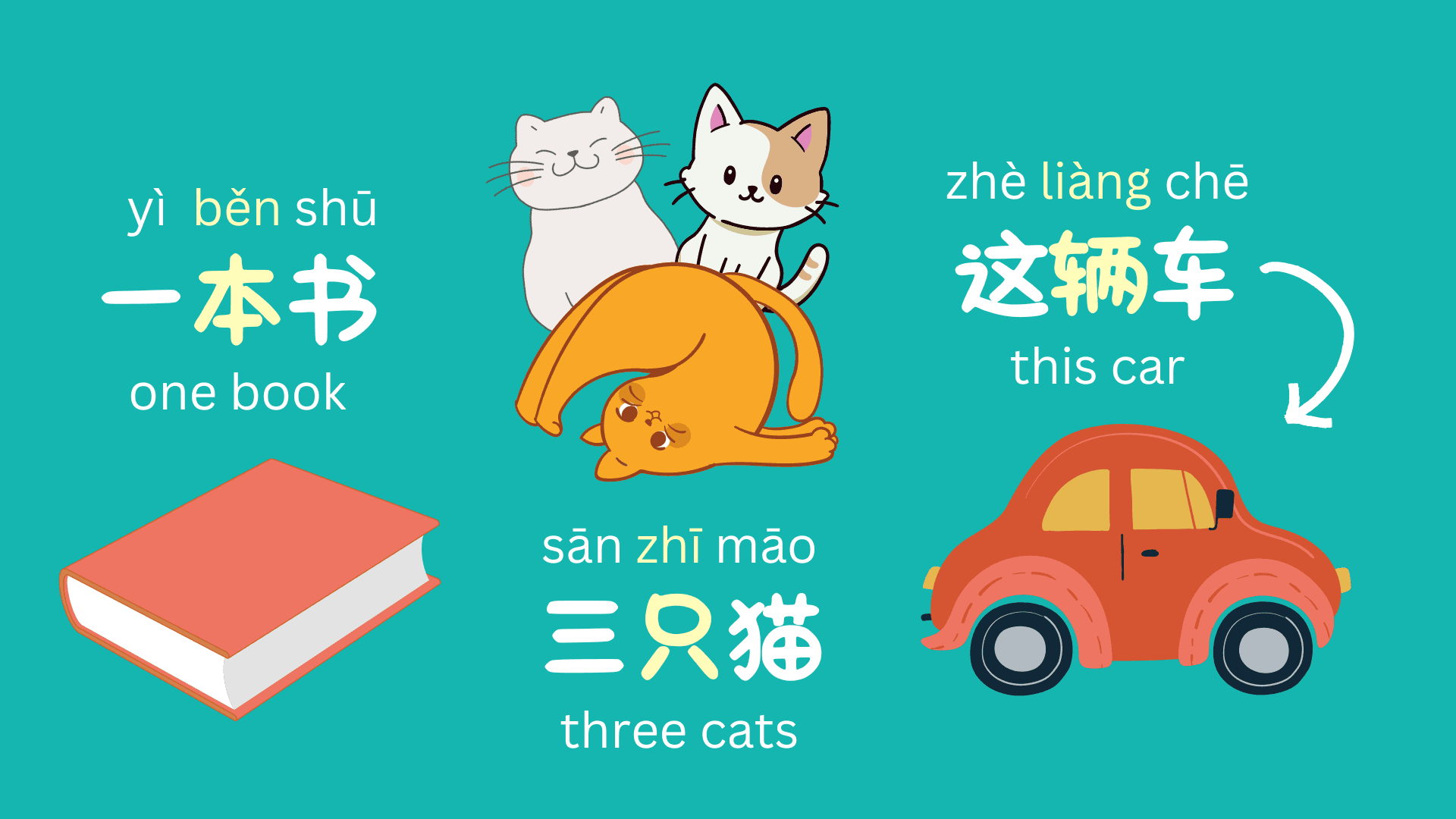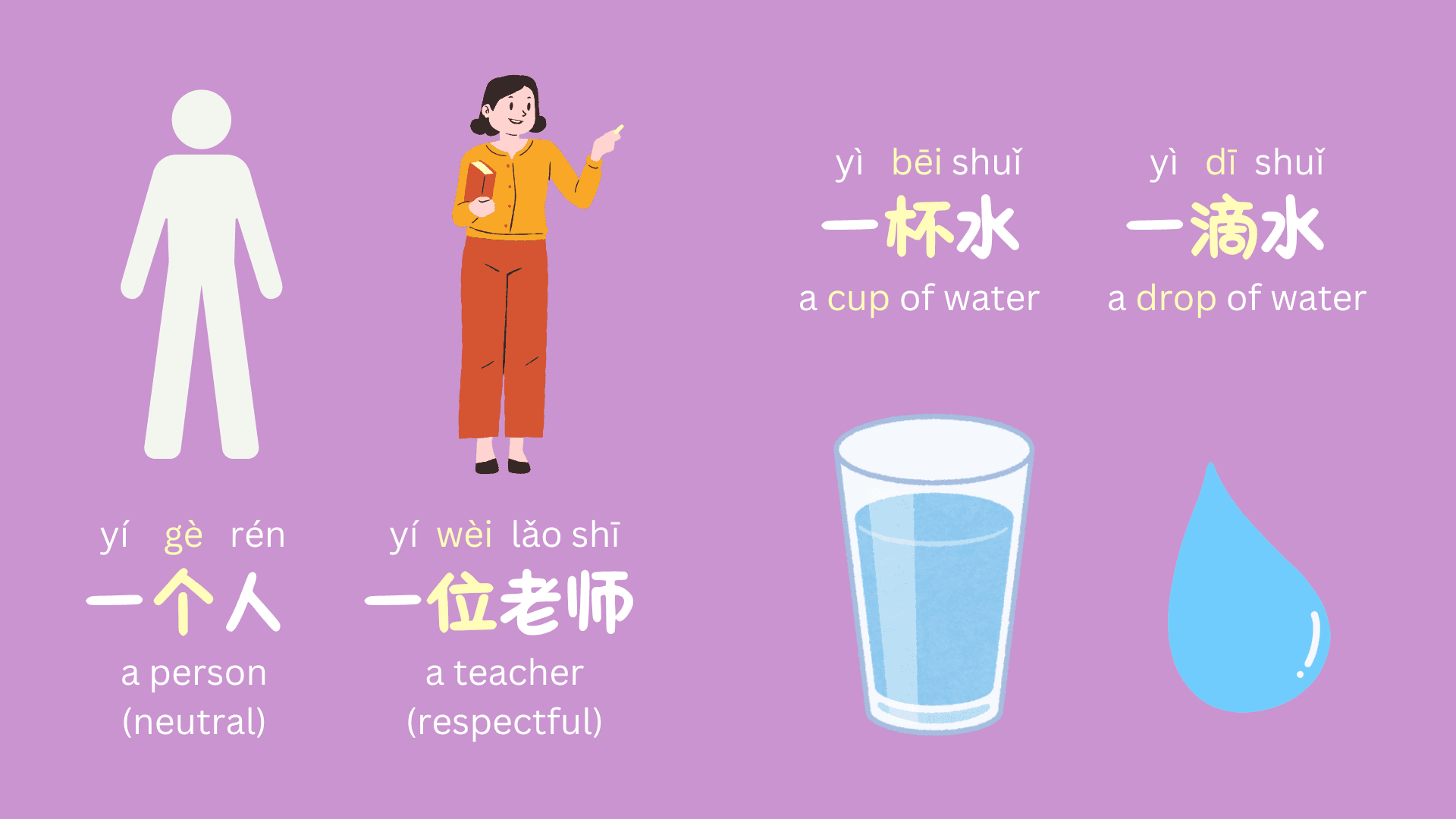If you're learning Chinese, you've likely encountered the unique challenge of measure words, or classifiers. These small but crucial elements of the language can be perplexing for many learners. But fear not! In this article, we'll dive into the world of Chinese measure words, offering tips and tricks to help you master their usage.
Measure words, or classifiers, are special words used before nouns in Chinese. They're essential for correctly quantifying objects, people, or concepts. While English occasionally uses similar structures (like "a piece of paper" or "a flock of birds"), Chinese takes this concept to a whole new level, requiring measure words for virtually every noun.
Understanding Measure Words
In Chinese, measure words bridge between a number (or demonstrative pronoun) and a noun. They provide information about the shape, size, or nature of the object being counted.
For example:

- 一本书 (yì běn shū) - one book
- 三只猫 (sān zhī māo) - three cats
- 这辆车 (zhè liàng chē) - this car
In these examples, 本 (běn), 只 (zhī), and 辆 (liàng) are measure words. They're crucial for grammatical correctness and often provide subtle information about the noun they're describing.
Common Categories of Measure Words
Here is a table that covers common categories of measure words with examples:
| Category | Measure Word | Usage | Examples |
| General | 个 (gè) | Most common, used for many objects | 一个苹果 - an apple三个问题 - three questions这个想法 - this idea |
| 只 (zhī) | Often used for animals and some objects | 两只猫 - two cats一只鞋 - one shoe三只笔 - three pens | |
| 张 (zhāng) | Used for flat objects | 一张纸 - a sheet of paper两张桌子 - two tables三张照片 - three photos | |
| People | 位 (wèi) | Polite measure word for people | 一位老师 - a teacher两位客人 - two guests三位专家 - three experts |
| 名 (míng) | Often used for professionals or in formal contexts | 一名医生 - a doctor两名学生 - two students三名警察 - three police officers | |
| 个 (gè) | Informal use for people | 一个朋友 - a friend两个孩子 - two children三个人 - three people | |
| Animals | 只 (zhī) | Used for most small to medium-sized animals | 一只狗 - a dog两只鸟 - two birds三只兔子 - three rabbits |
| 头 (tóu) | Used for larger animals, especially livestock | 一头牛 - a cow两头猪 - two pigs三头大象 - three elephants | |
| 匹 (pǐ) | Specifically used for horses | 一匹马 - a horse两匹骏马 - two stallions | |
| Objects | 本 (běn) | Used for books and bound items | 一本书 - a book两本杂志 - two magazines三本词典 - three dictionaries |
| 辆 (liàng) | Used for vehicles | 一辆车 - a car两辆自行车 - two bicycles三辆公交车 - three buses | |
| 把 (bǎ) | Used for objects with handles | 一把伞 - an umbrella两把椅子 - two chairs三把刀 - three knives | |
| Pairs | 双 (shuāng) | Used for pairs of items, especially those for hands or feet | 一双鞋 - a pair of shoes两双袜子 - two pairs of socks三双筷子 - three pairs of chopsticks |
| 对 (duì) | Used for pairs that naturally come together | 一对夫妻 - a married couple两对耳环 - two pairs of earrings三对手镯 - three pairs of bracelets | |
| 副 (fù) | Used for pairs of items, often accessories | 一副眼镜 - a pair of glasses两副扑克牌 - two decks of cards三副手套 - three pairs of gloves | |
| Less Common | 条 (tiáo) | Used for long, thin objects | 一条河 - a river两条鱼 - two fish三条裤子 - three pairs of pants |
| 朵 (duǒ) | Used for flowers and clouds | 一朵花 - a flower两朵云 - two clouds三朵玫瑰 - three roses | |
| 台 (tái) | Used for machines and electronic devices | 一台电脑 - a computer两台冰箱 - two refrigerators三台打印机 - three printers |
By the way, if you're curious about the usage of Chinese numerals for counting items, here is a thorough guide on Chinese Numbers.
Tips for Mastering Measure Words
- Learn measure words with their associated nouns
Instead of memorizing measure words in isolation, learn them alongside the nouns they commonly describe. For example, learn 本书 (běn shū) rather than just 本 (běn).
- Practice with flashcards or apps
Create flashcards with the measure word + noun combination on one side and the English translation on the other. Many language learning apps also offer specific exercises for measure words.
- Listen for measure words in native speech
Pay attention to how native speakers use measure words in conversations, movies, or podcasts. This will help you internalize their usage and improve your listening comprehension.
- Use context clues when unsure
If you forget a specific measure word, try to use context to guess. Often, the shape or nature of the object can give you a clue about which measure word to use.
- Create your own examples
Challenge yourself to create sentences using different measure words. This active learning approach can help reinforce your understanding.
Contextual Usage and Nuances
Understanding how measure words can change the meaning or nuance of a sentence is crucial. Let's explore some examples:

- Changing perception with measure words:
- 一个人 (yí gè rén) - a person (neutral)
- 一位老师 (yí wèi lǎoshī) - a teacher (respectful)
- Measure words affecting meaning:
- 一杯水 (yì bēi shuǐ) - a cup of water
- 一滴水 (yì dī shuǐ) - a drop of water
- Colloquial usage:
- In some regions, 只 (zhī) is used more broadly, even for inanimate objects.
- In some northern dialects, 个 (gè) might be used even more frequently than in standard Mandarin.
- In Cantonese, some measure words differ from Mandarin, like using 架 (gaa3 in Cantonese) for vehicles instead of 辆 (liàng) in Mandarin.
Understanding these regional differences can be particularly helpful if you plan to live or work in specific Chinese-speaking regions. However, for general communication and formal contexts, it's best to stick to standard measure word usage.
Common Mistakes and How to Avoid Them
When learning Chinese measure words, learners often encounter several common pitfalls. Being aware of these can help you avoid them:
- Using the wrong measure word
This is perhaps the most common mistake. For example, using 个 (gè) for books instead of 本 (běn). To avoid this, focus on learning measure words in context with their associated nouns.
- Omitting measure words entirely
Some learners, especially those from languages without measure words, might forget to use them. Remember that in Chinese, measure words are essential for grammatical correctness.
- Over-relying on 个 (gè)
While 个 (gè) is indeed a common and versatile measure word, overusing it can make your Chinese sound unnatural. Strive to use specific measure words when appropriate.
To overcome these challenges, consistent practice and exposure to authentic Chinese language materials are key. Don't be afraid to make mistakes – they're a natural part of the learning process.
Final Thoughts
Mastering Chinese measure words is a journey that requires time, practice, and patience. Even native Chinese speakers occasionally debate the most appropriate measure word for certain objects. The key is consistent practice and exposure to the language.
By understanding the basic categories of measure words, learning them in context with their nouns, and being aware of common mistakes, you'll be well on your way to using measure words confidently and accurately. Keep practicing, stay curious, and don't be afraid to ask native speakers for clarification when you're unsure.
As you continue your Chinese language journey, you'll find that measure words, far from being a burden, add a layer of precision and elegance to your expression. They're a unique feature of the Chinese language that, once mastered, will significantly enhance your fluency and understanding.